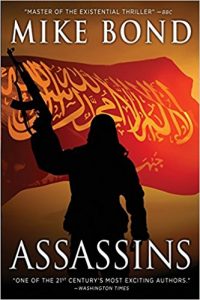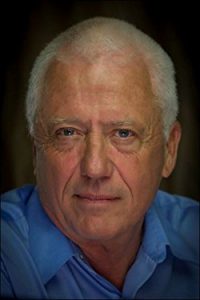Beginning with a parachute drop in the night skies of 1980’s Afghanistan and ending in the recent Paris terrorist attacks, Assassins is a contemporary historical novel of last thirty years of conflict between Islam and the West. Based largely on my own experiences and those of others I know, Assassins lives this unending war through the eyes of an American commando, a French doctor, an Afghani peace activist, a Russian major, an Afghani warlord, a British journalist, and a top CIA operative. It takes place in many unknown foreign locations, as well as the hidden corridors of power in Washington, Paris, Kabul, Baghdad, and elsewhere.
1) Purpose
 Although Assassins is “an exhilarating spy novel” (Kirkus), it’s also the backstory, much of it covert, of our tragedies in the Middle East. And more deeply, it’s a portrayal of the power of love when at any moment you both can die, the intensity of life when it can be instantly lost, and the mystery of creation, of this universe and time, so profound and so little understood.
Although Assassins is “an exhilarating spy novel” (Kirkus), it’s also the backstory, much of it covert, of our tragedies in the Middle East. And more deeply, it’s a portrayal of the power of love when at any moment you both can die, the intensity of life when it can be instantly lost, and the mystery of creation, of this universe and time, so profound and so little understood.
I started Assassins after 9/11, as a catharsis, to deal with PTSD, and as an attempt to understand how this tragedy has unfolded. From there I grew the book to reflect where we are now and seem to be headed. War has played a major part in my life, and I have been driven for years to understand it better, so as to minimize its effects in the future. It is this experience and this goal I try to transmit to my readers. Because if we don’t put an end to war it will soon put an end to us.
2) Literary Roots of Assassins
As Assassins is my seventh novel, no specific books influenced its creation. But the knowledge and wisdom of thousands of books has sunk into my subconscious like rain into soil, to go deep then surface as a stream and return to the sea and sky: that is what novels are. Following, however, are several novels which have deeply impacted me:
- Hemingway, any of his war books. In my view he is the finest novelist of the 20th Century – maximum emotion and perfect description in a minimum of words. For Whom the Bell Tolls and Farewell to Arms both powerfully concentrate the war experience into a few hundred pages: not just the terror and uncertainty but the intensity it gives to love, and to the love of life.
- Germinal, by Emile Zola, for its use of brilliant fiction to reveal political and historical truths.
- War and Peace – the span of history and its intimacy on the human scale.
- Irène Némirovsky – any of the masterpieces of this 1930s genius sent by the French to Auschwitz – how to portray the depths of emotion in inanimate objects, in a landscape, in the power of a young woman’s awareness. It is sad that so few of her magnificent books are available in English. It’s worth learning French just to read them.
- Les Misérables, one of the greatest novels of all time for its rendering of human fate and how the human heart can overcome destiny.
3) Experiences as the Source of Literature
Rather than books, what influences my novels most directly is experience. In the fifteen years it took to write Assassins, what drove me was the memories of the wars and places I’d been in, and which became the subject of the book (and some of my other books). As a teenager at the end of the Algerian War, to the Sinai, Beirut, Guatemala, El Salvador, Somalia, Afghanistan and Iraq, plus other nasty bloodbaths in other forgotten places, war has played a central role in my consciousness.
What drove me also was a need to tell the truth. So much of recent history has been fabricated by the winners. The story of what really happened has been wiped from the slate. The victims’ voices have been silenced. I write to give them back their voices, to tell what really happened.
Thus I wrote Assassins to pass on what I know about war. What it’s like to be there – in the firefights and street battles, hunched in bombed-out cellars under the rain of high explosives, or alone in a foreign and dangerous place where capture means horrible torture and a lonely death. Because these are the experiences that teach us, that give depth and breadth to our lives.
4) Speaking the Truth
But I also wanted to reveal the miscues, screw-ups, victories and defeats of America’s dismal involvement in the Middle East. For instance Bush and Cheney’s lies about WMDs that led to the 2003 Iraq invasion which has since killed a million people and destroyed two countries. Or our many other Middle East invasions, takeovers, assassinations, and oil thefts. Because only if we understand what we’ve done right and wrong can we annul the growing cycle of violence between Islam and the West.
5) Stories that Keep Us Alive
My readers tell me that I change them, that they can never again see the world the way they did. This is my intent: to create the depth of experience so powerfully that my readers feel they have been there, and the experience becomes theirs, the memory theirs. Not of humdrum everyday events but the profound life-changing awarenesses that are the reason for our existence.
When others ask me how to write I tell them write your deepest experiences, your real pains and fears, your joys and sacred moments. That we shouldn’t write what we don’t know, that’s called fantasy. That we shouldn’t be afraid to live deeply, it will reflect in what we write.
We don’t become writers by reading; we are writers by living. Our love of stories comes from our nights around the fire in our Paleolithic caves, sheltered from the blizzards and the cave lions. We told each other stories – histories of our ancestors, of where the antelope could be hunted and how to survive the cave bear. Stories that passed on the truths of life and gave understanding. Stories that keep us alive.
 Best-selling novelist, war and human rights journalist and ecologist, Mike Bond has lived and worked in many dangerous and war-torn regions of the world. His critically acclaimed novels depict the innate hunger of the human heart for good, the intense joys of love, the terror and fury of battle, the sinister conspiracies of dictators, corporations and politicians, and the beauty of the vanishing natural world.
Best-selling novelist, war and human rights journalist and ecologist, Mike Bond has lived and worked in many dangerous and war-torn regions of the world. His critically acclaimed novels depict the innate hunger of the human heart for good, the intense joys of love, the terror and fury of battle, the sinister conspiracies of dictators, corporations and politicians, and the beauty of the vanishing natural world.







